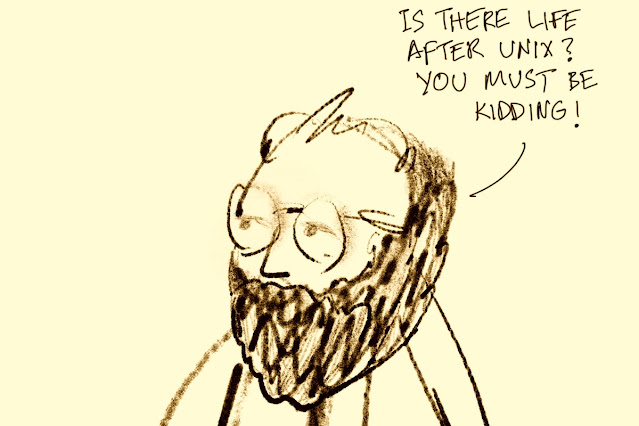Unix Guru : Universe Came After the Unix Epoch
His dressing is ultra casual: T-shirts and jeans. The t-shirts are company swags, and speak volumes of the profound ancestry of thought from which he descends: Sun, IBM, and the likes. On a day he feels fashionable, he sports a suspender.
And, of course, that tie-dye t-shirt! A Friday staple, because thats when he lets his hair down, and writes some funky obfuscated code between coffees. Those codes have gone down the annals of coding history for their amazing brevity. You may have heard about the C-code that draws a map of the world. That’s him who wrote it.
He is known as the “Unix Guru” in the premises he inhabits. No one knows what that phrase really means anymore, but everyone has a vague idea of an Unix Guru as someone who is super good, excellent in fact, at his work. And he knows his stuff. Yes, thats what it is. He is a man who knows his stuff. There are very few like him these days.
The Unix Gurus in this universe come in many names: Rick, Nick, Bill, Ken, … The common short names make you feel like you can talk to them easily, that they are approachable, which they are, but only if you come to them to discuss a problem that they may find interesting, such as multithreading, for example. Do not go to them with a question about Java. Rick is known to have killed a hapless young coder and suspended him forever in the Matrix, only because he said the word “Java” in passing; the poor guy was actually talking about the origins of his coffee. So it goes.
They are a dying breed, these Unix Gurus. I met up with Nick for lunch the other day, and he could barely conceal his disdain for the newfangled programming languages, and the programmers. “Look at them!” he said, as he chomped on a substantial piece of steak, “I do not call them programmers. Programming has stopped being an art. You just write some code that does the job most inefficiently, and you let the world clean up after you. What a waste of human minds!”
I nodded. “I agree that the art has nearly disappeared. However, it will still be there as long as there are people like you, Nick.”
“Not too long … not too long,” Nick murmured between tweets he was sending out. “We are on our way out. I see a future filled with programmers wallowing in a fetid soup of sub-par code and inefficiency.”
“To the future, for whatever it may bring!” I raised my Kombucha. It might have been the light in the cafe playing with my vision, but I swear I could see moisture condensing over the eyes of Old Nick.



Comments